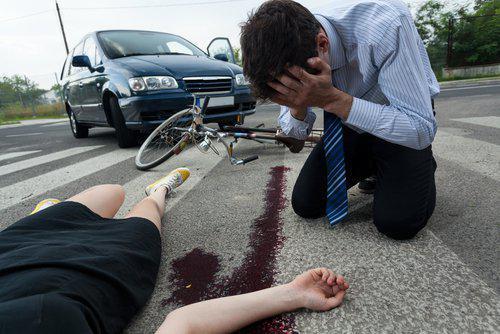Recent Blog Posts
Bicycle Accident Injuries
 Bicycle accidents, especially ones involving motor vehicles, can result in serious or life-threatening injuries. In Wisconsin, almost every time a bicyclist is involved in a motor vehicle accident, he or she is likely to suffer injuries. In 2012, over 1,100 bicyclists were involved in accidents, and 1,049 suffered injuries while 11 were killed as a result of the accident. This translates to an average of one bicyclist injured every 8.3 hours. As recently as March 24, 2015, a 22-year-old Sheboygan native was riding his bicycle in the morning when a pickup truck collided with him. He suffered injuries as a result of the accident and died the next day.
Bicycle accidents, especially ones involving motor vehicles, can result in serious or life-threatening injuries. In Wisconsin, almost every time a bicyclist is involved in a motor vehicle accident, he or she is likely to suffer injuries. In 2012, over 1,100 bicyclists were involved in accidents, and 1,049 suffered injuries while 11 were killed as a result of the accident. This translates to an average of one bicyclist injured every 8.3 hours. As recently as March 24, 2015, a 22-year-old Sheboygan native was riding his bicycle in the morning when a pickup truck collided with him. He suffered injuries as a result of the accident and died the next day.
Bicyclists and motor vehicle operators are required to obey the rules of the road. Generally, these rules include exercising ordinary care for their own safety and the safety of others. They are also required to obey the traffic laws.
Premises Liability Primer: Who is Responsible and How Do I Recover?
 Many of the personal injury accidents that transpire within Wisconsin occur on someone else’s property, either inside or outside a building. These types of accidents are identified as premises liability, cases and they can occur on public or private property when dangerous conditions are present.
Many of the personal injury accidents that transpire within Wisconsin occur on someone else’s property, either inside or outside a building. These types of accidents are identified as premises liability, cases and they can occur on public or private property when dangerous conditions are present.
Dangerous conditions create unreasonable risks of harm. For example, unreasonable risks of harm are found in scenarios involving poorly maintained premises, improperly constructed stairwells, or when premises owners fail to give adequate warning of a dangerous condition. If you, or someone you know, entered a dangerous premise and suffered an injury due to a slip and fall on someone else’s property, you should contact an experienced personal injury attorney as soon as possible. In Wisconsin, the statute of limitations provides only three years from the date of injury to file a claim, thus it is important to act quickly.
Construction Accidents in Wisconsin
 Regardless where a construction site is located, whether it is at a commercial building, private home or an interstate, it is usually a dangerous place to be. Construction work is dangerous because it is physically demanding and it is often performed outside, where workers are exposed to the natural elements. The terrain is not always even, weather is unpredictable and, very often, construction workers change surroundings frequently—they rarely work in the same place for extended periods of time. These factors alone can increase the likelihood of a construction-related injury.
Regardless where a construction site is located, whether it is at a commercial building, private home or an interstate, it is usually a dangerous place to be. Construction work is dangerous because it is physically demanding and it is often performed outside, where workers are exposed to the natural elements. The terrain is not always even, weather is unpredictable and, very often, construction workers change surroundings frequently—they rarely work in the same place for extended periods of time. These factors alone can increase the likelihood of a construction-related injury.
According to the Occupational Safety & Health Administration (OSHA), the four leading causes of injury or death at the worksite across the United States involve falling, being struck by various objects, electrocutions and getting caught between structures or equipment. In the private sector alone, there were over 3,900 work-related deaths in a single year. Approximately 796 of those deaths were related to construction accidents and the leading causes identified above. The largest majority of construction-related deaths occurred due to falls.
Pedestrian Accidents: Not Even Safe While Walking Down the Street
 Pedestrians swarm the streets of Milwaukee, using their own two legs to get around town. And while automobile accidents are scary events that result in injuries to everyone involved, when they involve pedestrians, they usually result in serious injuries or even death.
Pedestrians swarm the streets of Milwaukee, using their own two legs to get around town. And while automobile accidents are scary events that result in injuries to everyone involved, when they involve pedestrians, they usually result in serious injuries or even death.
According to the National Highway Traffic Safety Administration in 2013, over 4,700 pedestrians were killed and over 66,000 suffered injuries as a result of a motor vehicle accident across the United States. In Wisconsin alone, according to the Department of Transportation in 2013, over 1,270 pedestrians were involved in motor vehicle accidents. Out of those accidents involving pedestrians, 1,231 suffered injuries while 25 lost their lives.
Playgrounds: Endless Jungles of Entertainment or Hidden Minefields of Injuries
 Playgrounds for children are places meant for fun, laughter and life-long memories. But, some playgrounds can be among the most dangerous places for children to play. There are many activities available to keep children occupied, such as swing sets, monkey bars, slides, ladders, etc. Although these activities and obstacles offer children many different ways to socialize, exercise and avoid boredom, they unfortunately provide ample opportunities for children to suffer severe injuries.
Playgrounds for children are places meant for fun, laughter and life-long memories. But, some playgrounds can be among the most dangerous places for children to play. There are many activities available to keep children occupied, such as swing sets, monkey bars, slides, ladders, etc. Although these activities and obstacles offer children many different ways to socialize, exercise and avoid boredom, they unfortunately provide ample opportunities for children to suffer severe injuries.
According to the United States Consumer Product Safety Commission (CPSC), approximately 200,000 children suffer playground-related injuries each year. The most common injuries sustained at playgrounds involve children falling to the ground from the equipment they are using. In Wisconsin, playground falls are the leading cause of injuries to children between the ages of five and nine. The American Academy of Orthopaedic Surgeons found that the vast majority of injuries suffered by children at playgrounds involve climbing equipment and swings. The types of injuries children suffer range from minor cuts and bruises to fractures and amputations.
Large Commercial Trucking Accidents: The Intersection of Liability and Negligent Hiring
 These days, whenever you check the news or turn on the television, it seems when a heavy commercial truck is involved in an accident with a passenger automobile, the automobile driver suffers more serious injuries than the driver of the commercial truck. This result is all too common due to the basic laws of physics and the vast disparity in weight between these types of vehicles.
These days, whenever you check the news or turn on the television, it seems when a heavy commercial truck is involved in an accident with a passenger automobile, the automobile driver suffers more serious injuries than the driver of the commercial truck. This result is all too common due to the basic laws of physics and the vast disparity in weight between these types of vehicles.
A standard large commercial truck can weigh more than 20 times a traditional passenger automobile. Passenger automobiles weigh anywhere between one and two tons, whereas a fully loaded large commercial truck could weigh upwards of 20 tons. The sheer size and weight of a large commercial truck makes it a deadly weapon if it is driven by an inattentive, distracted, or improperly trained driver. For these reasons, trucking companies are required to carefully evaluate and properly train drivers before permitting them to operate large commercial trucks.
The Sharp Truth about Dog Bites
 Many United States citizens love their four-legged canine friends, and these furry creatures are treated like companions and family members. Most dogs are loyal, loving and obedient. But sometimes, these loyal and obedient dogs divert from their composed personalities and bite people. Each year, thousands of individuals in the United States sustain injuries related to dog bites and a large proportion of those injuries are made up of children.
Many United States citizens love their four-legged canine friends, and these furry creatures are treated like companions and family members. Most dogs are loyal, loving and obedient. But sometimes, these loyal and obedient dogs divert from their composed personalities and bite people. Each year, thousands of individuals in the United States sustain injuries related to dog bites and a large proportion of those injuries are made up of children.
According to the Insurance Information Institute, over 83.3 million households in America own a pet in 2013 and 2014. The Centers for Disease Control and Prevention estimates that over 4.5 million people suffer dog bites each year and over 885,000 require medical attention because of those injuries. Approximately half of the injuries requiring medical attention involve children.
Premise Liability: Who Is Responsible in a Slip and Fall Accident
 Accidents happen all the time and frequently, injuries occur as a result. But, when the injuries occur due to elements outside of your custody or control, legal recourse may be an option. When you slip and fall on someone else’s property, it may lead to a premises liability case. You need to prove that the property owner is liable for your injuries — that the homeowner was negligent in some way.
Accidents happen all the time and frequently, injuries occur as a result. But, when the injuries occur due to elements outside of your custody or control, legal recourse may be an option. When you slip and fall on someone else’s property, it may lead to a premises liability case. You need to prove that the property owner is liable for your injuries — that the homeowner was negligent in some way.
When a homeowner hosts a party and invites guests, the homeowner will most likely be liable for any injuries the guests suffer while on the premises. A homeowner owes a duty of reasonable care to guests. This means that a homeowner must provide a reasonably safe environment for guests invited onto the premises. Additionally, homeowners have a duty to prevent dangerous conditions unless the conditions are so obvious that the guests will avoid it.
Identifying Injuries in Elder Abuse or Neglect
 Every year, millions of elderly individuals in the United States are placed in residential facilities, nursing homes and assisted living centers. Unfortunately, the National Institutes of Health (“NIH”) estimates that over two million elderly United States residents placed in these types of facilities experience some form of abuse and neglect.
Every year, millions of elderly individuals in the United States are placed in residential facilities, nursing homes and assisted living centers. Unfortunately, the National Institutes of Health (“NIH”) estimates that over two million elderly United States residents placed in these types of facilities experience some form of abuse and neglect.
In 2009, NIH found that approximately 5,300 cases of abuse or neglect were reported to the Wisconsin Department of Health and Human Services, which maintains a sophisticated reporting system across the state of Wisconsin. According to the Wisconsin Department of Health and Human Services, of the 5,300 plus cases of suspected abuse or neglect involving elderly individuals in residential facilities, 28 were tragically related to death while another 371 incidents were considered-life threatening.
Burn Injuries: Recovering from the Carelessness of Others
 Burn injuries may be some of the most tragic, painful and horrific injuries a person can suffer. They can result in permanent disfigurement, significant medical expenses, and medical treatment that could potentially last a lifetime. If someone performed an act - or failed to act - in a situation that caused your injuries, and this person failed to act like a reasonably prudent person would in a similar situation, this individual could be held liable under the theory of negligence.
Burn injuries may be some of the most tragic, painful and horrific injuries a person can suffer. They can result in permanent disfigurement, significant medical expenses, and medical treatment that could potentially last a lifetime. If someone performed an act - or failed to act - in a situation that caused your injuries, and this person failed to act like a reasonably prudent person would in a similar situation, this individual could be held liable under the theory of negligence.
The American Burn Association estimates that, in 2013, over 450,000 people across the United States received medical treatment for injuries related to burns. Additionally, more than 3,400 people died due to fire, burn, and smoke inhalation injuries. Lastly, over 40,000 people were hospitalized due to burn-related injuries. According to the Wisconsin Department of Health and Human Services, in 2005, burn injuries sent over 7,770 citizens to emergency rooms across the state, over 600 citizens were hospitalized for longer-term care, and 61 individuals died as a result of their burn wounds.







